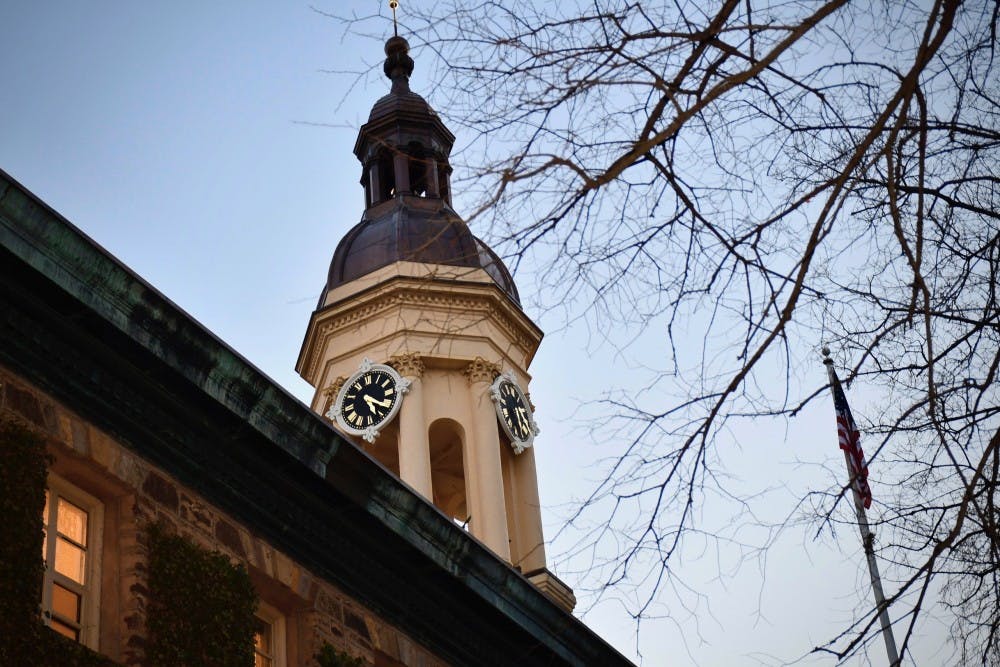On Monday, April 27, a faculty meeting approved a one-year extension of the tenure clock for assistant professors, according to Deputy University Spokesperson Mike Hotchkiss in an email to The Daily Princetonian.
The extension will be “opt-out,” applying to all current assistant professors whose review for tenure is scheduled in the academic year of 2020-21 or later, apart from those who choose to opt out, Hotchkiss explained.
The purpose of a term extension for tenure-track faculty at the University is to “mitigate the effects of the current public health crisis on their research and professional development,” Hotchkiss said in an earlier statement to the ‘Prince.’
In order to be implemented, the policy regarding tenure clock extension had to go through review and approval of the Faculty Advisory Committee on Policy and then receive the review and affirmative vote of the full faculty, which it did on Monday.
The University is the last in the Ivy League to announce the extensions for junior faculty.
Harvard University had announced an offer of a one-year extension for tenure-track faculty whose promotion reviews were scheduled for the fall of 2020 or later on March 21. Yale University enacted a similar one-year extension policy on the same date.
The American Sociological Association, in collaboration with dozens of other academic communities, put out a statement on March 23 calling for universities to enact a year-long tenure clock extension, citing the unexpected challenges junior faculty now face in terms of child care and student support as a result of the COVID-19 pandemic.
The University Office of Communications had no comment regarding the timing of Princeton’s announcement as compared to those of its peer institutions.

Still, in the face of the crisis, female junior faculty may face unique tenure challenges, even with the extension, according to Assistant Professor of History Eleanor Hubbard. Last year, Hubbard underwent the tenure review process and was ultimately denied.
“The policy seems to treat assistant professors equally, regardless of whether their research has been badly affected or not,” she wrote in an email to the ‘Prince.’
“Like other seemingly family-friendly policies, it runs the risk of backfiring, since assistant professors who are not drowning in childcare are going to be able to use it to get ahead on their work. In practice, this is likely to mean that women with children are going to have a harder time getting tenure, since childcare responsibilities tend not to be divided equally within the home.”
Hubbard pointed to a 2016 study that found that “family-friendly” and gender-neutral hiring policies might have advanced the careers of male economists at the expense of their female counterparts. Hubbard fears the pandemic will only exacerbate the significant challenge mothers already face on the path to tenure.

She emphasized, however, that she did not mean to imply her own tenure case had been influenced by the difficulties of completing research while being a parent.
“I’m not surprised that the University went in this direction because the policy’s neutrality insulates it from criticism,” she added.
Hubbard said she felt it would be helpful for her to provide comment, given that junior faculty who have yet to undergo tenure review are typically reluctant to speak publicly about advancement policy, for fear of jeopardizing their chances.
The ‘Prince’ reached out to nearly 20 junior faculty members affected by the extension. Most did not respond in time for publication, and three declined to comment.
Several tenured faculty members, however, spoke out about the need for a tenure clock extension.
Last week, seven tenured professors at the University signed a cross-institutional solidarity statement that commended the hundreds of universities across the country who have offered a year-long tenure clock extension to assistant professors, due to the burdens on research imposed by quarantine and the shrinking of the academic job market in light of the crisis.
For Henry G. Bryant Professor of Sociology and Public Affairs Douglas Massey, one of the signatories, the University’s recent announcement meets the petition’s call.
“I think Princeton is doing all it reasonably can to support its junior faculty during the time of the corona[virus],” he wrote in an email to the ‘Prince.’
The solidarity statement, however, did not only advocate for an extension for assistant professors. It went on to posit that while the extension for assistant professors is a necessary step, it does not go far enough in supporting academic workers. The statement called on universities to include all academic workers employed for fixed terms in this extension, such as graduate students. The petition added that this measure should be taken regardless of institutional position on the “employee status” of graduate students.
“Whether it is the ‘guaranteed’ package of funded years for graduate employees or the capped terms of lecturers and preceptors,” the statement read, “all academic workers deserve the relief of knowing that they have job security and the opportunity to complete their projects in more favorable conditions.”
As of now, graduate students are not included in the tenure clock extension, and the Princeton Graduate Student Union (PGSU) is currently petitioning for enrollment status extensions.
When asked whether he supports the PGSU’s petition, Massey wrote that he did not sign it.
“I believe it is not feasible or just to impose a single remedy on all students, regardless of their individual circumstances, status in their program, and disciplinary expectations,” he wrote. “I am confident Princeton will do all it can to accommodate the specific needs of each student in each department and field of scholarly endeavor.”
The academic worker solidarity statement’s other signatories included Hughes-Rogers Professor of African American Studies Imani Perry, Edwards Professor of History, Emeritus, Nell Irvin Painter, Laurence S. Rockefeller Professor of Politics and Human Values Philip Pettit, Professor of Creative Writing Yiyun Li, and Associate Professor of African American Studies Ruha Benjamin.
The professors who signed the statement did not respond to request for comment in time for publication.








